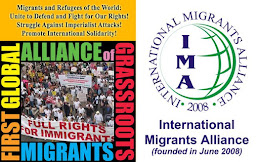Dear friends, Magandang hapon sa inyong lahat!
Thank you so much for inviting me to say a few words at this Christmas party.
It is the season to think about peace and goodwill, and that is what I will talk about.
I am speaking on behalf of the Centre for Philippine Concerns, a solidarity group that was formed four decades ago, in 1983, by Filipinos and non-Filipinos here in Montreal and Quebec.
It was the time of the people power movement, and many of us were inspired by that huge movement opposing the dictatorship of Ferdinand Marcos, which would oust him from power in 1986. True peace however, was short-lived as the fundamental situation in the country did not really change.
Over the years, we in Montreal formed long-lasting relationships with people’s organizations in the Philippines, who continue to struggle for fundamental change in the country and for a just and lasting peace.
I’ve visited the Philippines many times - it is such a beautiful country with lush vegetation, fertile soil and is rich in resources; but the land is still controlled by a few elite families, and foreign corporations are biggest beneficiaries of the mineral and other wealth which is shipped abroad. Shamefully for us, several big Canadian mining corporations are among those that extract the resources, at huge cost to the Philippines and its people, leaving behind poisonous mining waste and devastated landscapes.
With resources being exported abroad, there has been little industrialization and not enough jobs for the people.
As a result thousands of workers leave the country every day in search of a better life, or simply survival. Filipino migrant workers are found in many sectors, playing an essential role in Canada and other countries. But they are often exploited and have no permanent immigration status for years, separated from their families and communities. Meanwhile the Philippines is being deprived of a talented workforce.
Of course people in the Philippines have organized to defend their rights and improve their collective situation. Their courage and resourcefulness are an inspiration to many in PH, in Canada and around the world- peasant associations, unions, women’s organizations, youth and students, human rights defenders, etc.
But successive governments have seen them as a threat to the power of the élite classes.
Indeed, there have been terrible policies like the National Task Force to End Local Communist Armed Conflict (NTF-ELCAC) and the Anti-Terror Law – which has meant red-tagging, arrests, and even killings of activists, and even peace consultants. We have several friends who have been arrested and even killed. A civil war “dedicated to bringing about a more just society for the majority of Filipinos” is underway in the countryside.
How can there be just and lasting peace in the Philippines?
Peace talks in the past have resulted in important milestones such as the Comprehensive Agreement on Respect for Human Rights and International Humanitarian Law (CARHRIHL), signed in 1995.
There was even the beginning of peace talks with the Duterte government after he first came to power. But President Duterte axed the talks in 2017 and went on a rampage of killings and assassinations under the guise of the so-called War on Drugs. This bloody campaign resulted in over 12,000 and up to 30,000 deaths of mostly of poor people, according to the International Criminal Court.
But recently, in the midst of preparations for the holiday season there was an announcement that peace talks could resume.
On November 23th, 2023 the GRP and NDFP signed a joint statement expressing openness to the resumption of peace talks. We welcome this development as our organization has been calling for this resumption.
However, resuming peace talks is not just about the laying down of arms.
As we have seen in the past, peace without justice is not acceptable - the conditions of the people must improve. People must have a possibility of decent work, and livelihood in their own country and not be forced to go abroad.
Also, the party on the other side of the table from the government must not be designated as terrorist – it doesn’t make sense. Dropping the unjust terrorist tag would be a strong sign of good will on the part of the Philippine government.
And how can you negotiate if your team of peace talk advisors has been put in prison? Political prisoners must be released to have a meaningful dialogue as a further step to good will … on both sides.
So please join us,
Become a member of Centre for Philippine Concerns, help us celebrate the CPC’s fortieth anniversary this year, and support the people’s struggle for a just and lasting peace in the Philippines.
Maraming salamat po.
Marie Boti, representative of CPC
